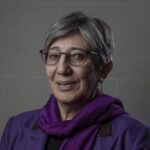
Sima Samar was appointed as a member of the United Nations Secretary-General’s High-Level Panel on Internal Displacement in December 2019. In addition to her role as a Panel member, she is a member of the UN Secretary-General’s High-Level Advisory Board on Mediation. Previously, Ms. Samar held the positions of Special Envoy of the President of Afghanistan and State Minister for Human Rights and International Affairs. She has also served as Chairperson of the Afghanistan Independent Human Rights Commission (AIHRC), as Minister of Women’s Affairs and as one of the only two women in the transition government at that time; Vice-Chair of the Emergency Loya Jirga and as UN Special Rapporteur on Human Rights in Sudan.
Born on 03 February 1957, Ms Sima Samar graduated from Kabul University Medical College in 1982 and started to practice medicine at a government hospital in Kabul. She was however forced after only a few months to flee for her safety to her native Jaghori from where she continued to provide medical treatment to patients throughout the remote areas of Central Afghanistan. In 1984, she went to Pakistan for the education of her young son and was then to engage in extensive work to provide protection and safety, health care, shelter, education, self-reliance and support for Afghan refugee children, girls and women notably through the Shuhada Organization and Shuhada Clinic she started in Quetta which would go on to operate several clinics, hospitals, primary and high schools in Pakistan and Afghanistan. On return to her country, Ms Samar continued from all the positions she held her championing advocacy, training, service programmes and work to help restore the rights of women and improve their economic, political, legal and social status including the right of women government employees to return to their jobs and to keep their seniority after maternity leave, representation of women as Loya Jirga delegates, re-entry of girls into schools and legal representation for women. As first Chairperson of the Afghanistan Independent Human Rights Commission established in 2002 and constitutionalized in 2004, Ms Samar reported bravely on pressing human rights challenges including the issues of civilian casualties, the realization of economic and social rights and the status of women, worked to strengthen the rule of law and end the culture of impunity and called for accountability for human rights violations of the past and present which even led to her receiving death threats from rights violators. She has established the non-profit Gawharshad Institute of Higher Education (GSIHE) which initially offers training in the fields of political science, political sociology, economic planning, leadership and administration in education and opportunities for women, poor and marginalized students through tuition subsidies and scholarships.